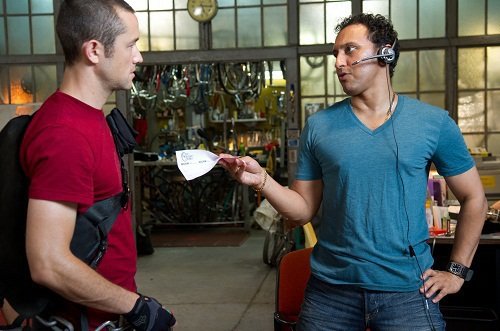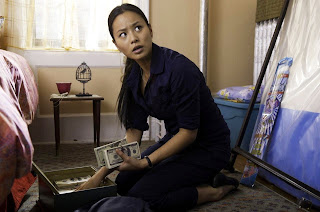Okay, as with a lot of days, I feel the need to issue a
disclaimer before we really get into this article. I know that I’m about to rip
Premium Rush a new one, that
shouldn’t be all that shocking to people who read here regularly (to anyone
stopping by for the first time, hello!), but I want to establish that I really
did like the movie. Honestly. It’s very fun, and a tense, well-written
thriller. Four stars.
My problem with the film had to do with the marginalization
of its minority and women (in this case, minority women) characters. Because
that was uncool and was sadly a huge part of the movie. But, before we start,
as always, let’s define our terms.
Premium Rush is an
urban thriller that came out this fall. Starring Joseph Gordon-Levitt, Dania
Ramirez, and Jamie Chung, it follows a New York bike messenger on the worst day
of his life. I mean, I hope it was the worst day of his life. I shudder to
think.
Anyway, Wylie (Gordon-Levitt, the messenger in question) is
having a crummy day. His boss keeps giving the best assignments to his rival,
his girlfriend (Ramirez) won’t talk to him, and people just keep giving him
guff about going back to law school. Everything gets worse, of course, when he
picks up a suspiciously small package from acquaintance Nima (Chung) and agrees
to deliver it. Almost immediately, he’s dogged by an intent NYPD detective who
wants him to hand over the envelope, and Wylie realizes pretty quickly that
he’s in deep.
The rest of the film is an artfully designed romp through
Manhattan as Wylie tries and despairs and tries to deliver the package,
wrangling with flashbacks, the girlfriend, rivals, and a detective intent on
actually killing him. It’s pretty, well-shot, and engaging. So why don’t I like
it?
Well, for starters, I don’t like this movie because it’s
very clear all the way through that it’s Wylie’s movie. He is the star. There’s
never any question about that. Why should I care about that when I knew it
going in, you ask? I care because Nima, the friend, is the one who actually has
stakes in the story. She’s the one who really cares if Wylie manages to make
the dropoff. Wylie would just have his professional pride hurt if he fails.
Nima’s life would be ruined.
SPOILERS.
So the suspicious envelope given to Wylie that he absolutely
must deliver by seven o’clock? It contains a ticket that represents
thirty-thousand dollars. In flashbacks, we see Nima take the money, in cash, to
a Chinese money changer, who gives her the ticket, and tells her that the
ticket is now the same as money, and whoever holds it has the money.
This eventually reaches the ears of our villain, Detective
Bobby Monday (Michael Shannon, and seriously, who came up with that name?).
Monday has a pretty bad mah-jong addiction and is in deep debt to the local
gaming houses. Plus he killed a guy. He needs to get the money so he can be
square with them. And thus we have our conflict.
The thing is, Nima’s using the money to pay a snakehead
(illegal border crossing person) to bring her infant son over from China, since
the government really doesn’t like her and won’t let him go any legit way. So
the whole stakes of the film rest on Nima wanting to see her son again, as well
she should, and Wylie making the delivery so that can happen.
When I talk about marginalization, I don’t mean that it’s
overt. Wylie doesn’t railroad Nima and decide that it’s his son out there, and
that he’s the one who will be most hurt by this if he fails. It’s more that the
film uses a frame that focuses on Wylie and his problems, when really, he could
quit any time and give Monday the money, and nothing would happen to him. He
has no reason to keep fighting back, aside from being a generally nice human
being.
And, again, it’s to his credit, greatly to his credit, that
he does keep going and he does make the delivery. But it’s sad to see that
Nima’s story, about her son and about the money and her worries for the future,
are seen as entirely secondary to the crappy day that some white guy is having.
Nima’s not the only character to get this treatment, either.
Wylie’s girlfriend, Vanessa, has her own problems going on. Nima was her
roommate, but dropped the bomb on her that Vanessa needs to move out
immediately. We as the audience know that this is because Nima is anticipating
the arrival of her son and needs the second bedroom, but from Vanessa’s
perspective, it kind of sucks. This girl who she thought was her friend is now
turning on her and she has no one to talk to.
But the film doesn’t allow Vanessa to have this storyline.
It, like the rest of the secondary characters’ stories, becomes incorporated
into Wylie’s narrative. Vanessa’s problems in having to move that day become a piece of the puzzle,
and another obstacle in front of Wylie getting his girlfriend back. He cares
less about her sudden homelessness than he does about the chance he’ll be
getting a leg over later.
I do like Wylie. I promise. I just don’t like the way the
narrative keeps marginalizing these stories.
And I don’t think it’s too “sensitive” of me to point out
that nearly all of the marginalized stories are those belonging to characters
of color. The hero and antagonist of this film, Wylie and Monday, are both
white, heterosexual men. It is their story and conflict that drives the plot
forward, even when the stakes belong to a female, minority, tangential
character. It’s like the movie decided that Nima wasn’t strong enough to be the
hero, so she needed a white male torch bearer. And I dislike that.
Personally, what would have fixed the whole thing for me is
if Nima had asked Vanessa to make the delivery. I mean, in the story as it
stands, Vanessa was kind of pissed at Nima, but it would still make more sense.
Nima needs someone she trusts implicitly in this, not the almost ex-boyfriend
of the person she trusts implicitly. And then we would have gotten a girl
power, minority main character fighting against “The Man”.
Instead, what we got was Wylie, who aside from being a
really likable guy, doesn’t have a whole lot of character development.
Sure,
he’s cool and he really likes riding a bike, but the film keeps trying to build
him up as this great hero of the people. He went to law school but he doesn’t
want to be a lawyer, even though he’s brilliant. This is supposed to make us
like him, that he hates desks and wants to break free, even though he spent a
buttload on education and could have a much better job.
Okay. Part of that I get. I too dropped out of the corporate
world, and I do now work jobs that are “below my education level”. But I have
reasons for this, reasons beyond “I hate desks.”* He’s also raised up to be the
best biker to ever bike, and that just rings false, since I can only assume
that in New York someone must be
better than him, and if he’s only making eighty dollars a day (about half what
a good bike messenger makes in real life), then he’s probably not all that
great.
Still. Reservations aside, this is a great movie. A great
popcorn movie, but a great one nonetheless. I give the film a lot of credit for
making the decision to have a strongly minority cast. Chung, Ramirez, and a
host of other actors do a great job with the material, and it does feel a lot
more like New York than most Hollywood productions.
Unfortunately, until these characters are allowed to carry
the brunt of their own stories, the film will remain a disappointment.
 |
| And I do love Aasif Mandvi. |
*My reasons are more along the lines of, “I could hear my
soul curdling,” “I really like working with kids more,” and “Now I have time to
write.”






Personally, what would have fixed the whole thing for me is if Nima had asked Vanessa to make the delivery. I mean, in the story as it stands, Vanessa was kind of pissed at Nima, but it would still make more sense.
ReplyDeleteNot just that, but Vanessa would be making the delivery - and facing the dangers - to facilitate the very thing that's making her homeless, a far greater test of decency than Wylie is facing.
Ooh. That would make this all so much more compelling. Well done.
DeleteThanks, but it was your idea. You should get the well done.
DeleteIf Vanessa makes the delivery, then that'd be a different movie, possibly a downgrade from the original, given the commercial incentive behind the film making. I mean, hollywood movies are still quite dominated by male protagonists, much a mainstream bias ... Vanessa story would be a fresh drive, but for ticket sales, I might doubt it a bit!
ReplyDeleteJust a bit thought^^